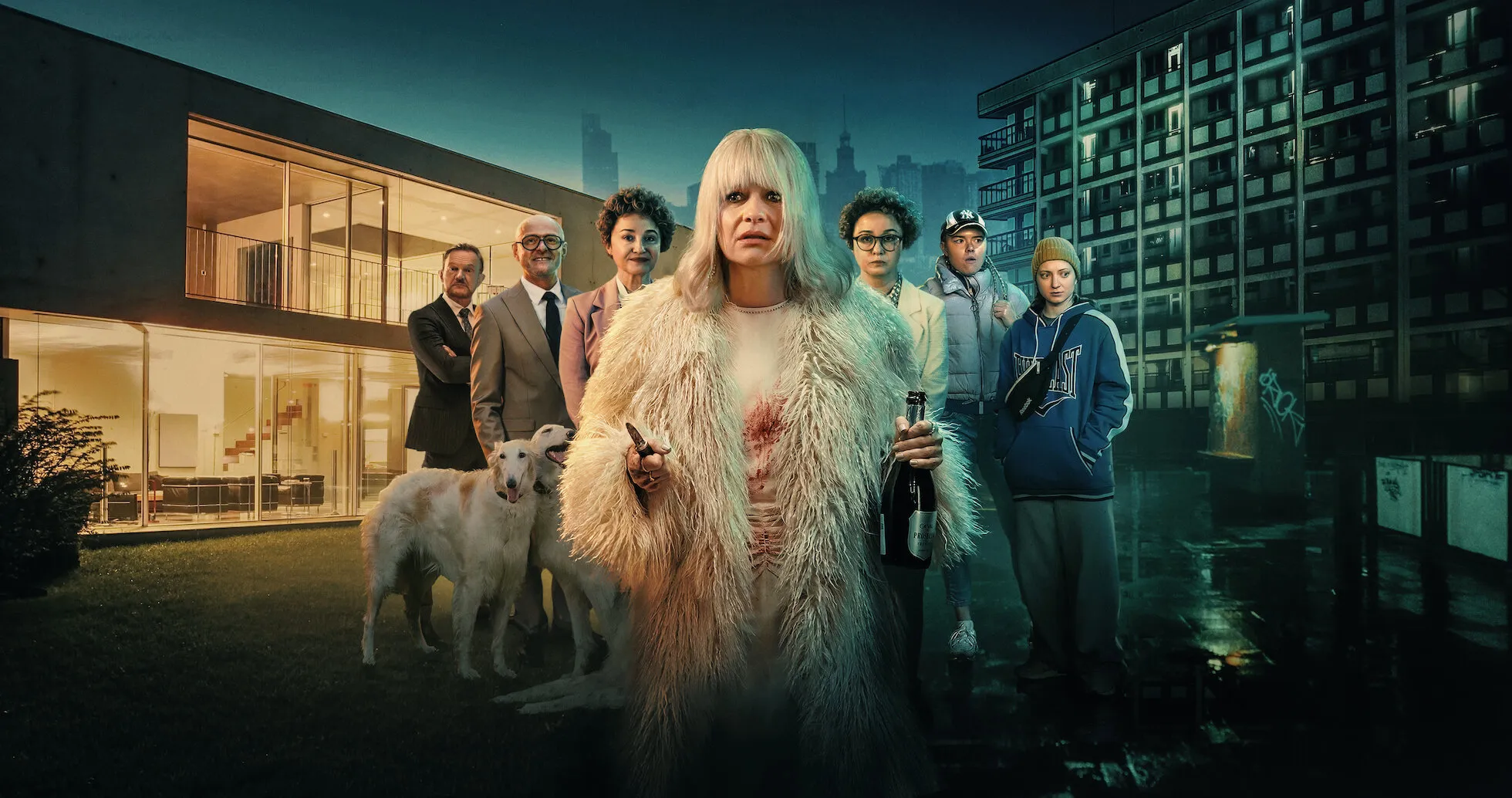Aniela appears to us first as a fixture of Warsaw’s elite, a woman whose identity is welded to her assets: a successful lawyer husband, a pristine daughter, and an art gallery that serves as a monument to her social standing. Her life is a carefully curated performance of modern European affluence.
The series presents this world not with aspiration but with a clinical coldness, preparing us for its demolition. The wrecking ball arrives in the form of her husband, Janek, who announces during a public gathering that he is leaving her. His justification is not a common affair but a new-age absurdity—he has found a soulmate from a past life.
Aniela’s reaction is anything but civilized. She grabs a knife from a buffet and repeatedly stabs him. This explosive act of violence is the show’s opening statement, a visceral rejection of the quiet suffering expected of women in her position. Her immediate arrest and the complete evaporation of her perfect life are not just plot points; they are the sudden, brutal stripping of a social construct.
Privilege in Freefall
The series wastes no time in plunging Aniela into her new reality. The fall is not just from wealth but from a state of being. Exiled to a grim housing project, she is a creature of the penthouse forced into the confines of the concrete block.
The show’s most daring choice is to make its protagonist so thoroughly repellent in these early stages. Aniela is not a victim seeking sympathy; she is an egotistical, complaining force of nature, utterly bewildered by a world without a gold card. Her rude dismissal of those attempting to help, like her best friend’s well-meaning sister, Edyta, is difficult to watch.
The humor here is sharp and uncomfortable, stemming directly from her cluelessness. This is not the familiar fish-out-of-water comedy. Instead, it is a pointed examination of the insulation that extreme wealth provides. By presenting a main character who is so aggressively unlikable, the show challenges the audience’s desire for palatable heroines and instead offers a fascinating study in social alienation.
Anarchy, Rap, and Rebirth
Aniela’s attempt to rebuild her life is anything but a straight line. The narrative mirrors her internal state: it is messy, tonally inconsistent, and prone to bizarre detours. The show rejects the clean arc of redemption for something far more frantic.
Her schemes are irresponsible, her methods are clumsy, and her progress is erratic. A pivotal development is her collision with a trio of teenage girls in her building, all aspiring rappers. This relationship becomes the show’s unexpected soul. The inclusion of a vibrant Polish rap soundtrack is a significant cultural marker, grounding the series in a specific, contemporary Warsaw and providing a sonic bridge between Aniela’s detached generation and the raw expression of the youth.
This choice signifies a growing confidence in global television to platform specific local arts without sanding them down for international consumption. The supporting cast members often feel like satellites in Aniela’s chaotic orbit, but perhaps that is the point; in a story about profound self-absorption, the world would naturally appear populated by bit-players.
A Portrait of Modern Resilience
The true achievement of the series is the transformation it allows Aniela to undergo. It is a change, but not a cure. The wonder is in watching her slowly acquire an awareness of others without losing the abrasive, melodramatic core of her personality.
She becomes a better person, but she is far from a perfect one, and this commitment to her flaws makes her growth feel authentic. This authenticity, however, does not excuse all of the show’s stumbles. Certain subplots, particularly a bizarrely villainous turn from a side character, feel like relics from a more conventional show and distract from the main story’s stronger elements.
Yet, the series succeeds in its primary mission: to offer a portrait of resilience that is loud, ungraceful, and unapologetic. It is a story for viewers who are fatigued by neat narratives and are ready to embrace a reflection of life that is as disorderly and strange as reality itself.
An!ela is performed in Polish. Availability might vary by region, but it’s likely streaming on platforms that carry international European TV series, such as Netflix, HBO Europe, or local Polish services.
Full Credits
Directors: Kuba Czekaj, Jakub Piatek
Producers: Magdalena Kaminska, Agata Szymanska
Cast: Renata Dancewicz, Marcelina Binczyk, Małgorzata Kożuchowska, Cezary Pazuura, Gabriela Muskała, Filip Plawiak, Jacek Poniedziałek
The Review
Aniela Season 1
Aniela is a volatile and daring character study, rejecting easy sentiment for a chaotic look at a privileged woman's undoing. While its narrative stumbles and abrasive tone will polarize viewers, its commitment to an imperfect, difficult protagonist is a refreshing and potent statement. It offers a raw, culturally specific portrait of resilience that feels vital in a landscape of polished stories. It is a challenging watch that rewards those willing to embrace the mess.
PROS
- A bold and complex female anti-heroine with an authentic character arc.
- Sharp, often humorous critique of class division and insulated wealth.
- Effective use of a Polish rap soundtrack to create a specific cultural identity.
- Rejects tidy narrative conventions for a more realistic, disorderly story.
CONS
- An uneven tone that shifts abruptly between drama and dark comedy.
- Certain subplots and supporting characters feel underdeveloped and unnecessary.
- The protagonist’s intensely abrasive nature may alienate some viewers.
- The narrative structure can feel disjointed and messy at times.
